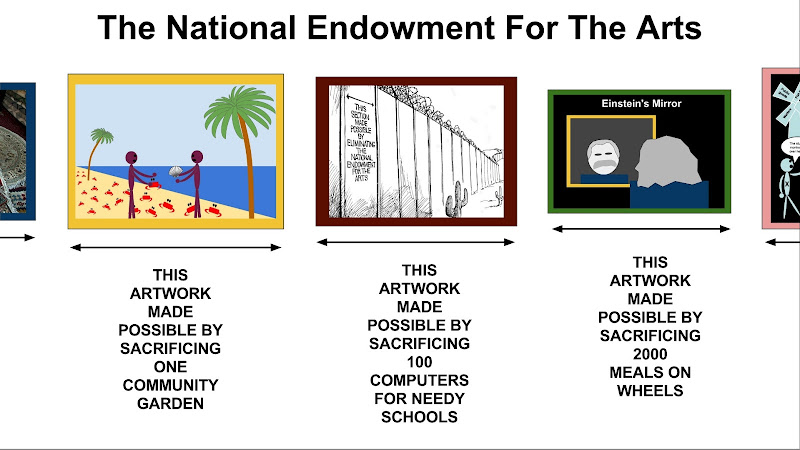- Joined
- Sep 16, 2010
- Messages
- 2,071
- Reaction score
- 163
- Gender
- Male
- Political Leaning
- Other
On Twitter I saw this tweet with this pic...

There's no such thing as a free lunch. The massive amount of resources needed to build a giant wall aren't going to magically appear out of thin air. They are going to be taken from other endeavors. However, this is just as true for the National Endowment for the Arts (NEA) as it is for a giant wall. Here's how I illustrated this...

If you genuinely appreciate that every endeavor is going to take resources away from other endeavors... then clearly the goal should be to take resources away from the least valuable endeavors. This is Quiggin's Implied Rule of Economics (QIRE).
Imagine that Batman is at home twiddling his thumbs. In this case, there would be absolutely no problem with having him rescue a cat from a tree. Batman would be put to a more valuable use. But what if Batman isn't at home twiddling his thumbs? What if he is actually trying to save Gotham from imminent destruction? Then it would be a terrible idea for him to stop what he's doing in order to rescue a cat from a tree. The opportunity cost would be way too high.
So the most important question is... how do we determine the actual value of an endeavor?
Market = Everybody decides for themselves, with their own money, which trade-offs are acceptable
Not-market = Everybody does not decide for themselves, with their own money, which trade-offs are acceptable
How many places are missing a market? The public sector is missing a market. Taxpayers can't decide for themselves, with their own taxes, which trade-offs are acceptable.
Netflix is also missing a market. Subscribers can't decide for themselves, with their own fees, which trade-offs are acceptable. The NY Times is also missing a market. So is this forum.
There's a multitude of places that are missing markets. Therefore...
A. Markets aren't the best way to determine the value of endeavors?
B. In some cases it's not necessary to know the value of endeavors?
C. People don't understand the benefit of using markets to determine the value of endeavors?

There's no such thing as a free lunch. The massive amount of resources needed to build a giant wall aren't going to magically appear out of thin air. They are going to be taken from other endeavors. However, this is just as true for the National Endowment for the Arts (NEA) as it is for a giant wall. Here's how I illustrated this...

If you genuinely appreciate that every endeavor is going to take resources away from other endeavors... then clearly the goal should be to take resources away from the least valuable endeavors. This is Quiggin's Implied Rule of Economics (QIRE).
Imagine that Batman is at home twiddling his thumbs. In this case, there would be absolutely no problem with having him rescue a cat from a tree. Batman would be put to a more valuable use. But what if Batman isn't at home twiddling his thumbs? What if he is actually trying to save Gotham from imminent destruction? Then it would be a terrible idea for him to stop what he's doing in order to rescue a cat from a tree. The opportunity cost would be way too high.
So the most important question is... how do we determine the actual value of an endeavor?
Market = Everybody decides for themselves, with their own money, which trade-offs are acceptable
Not-market = Everybody does not decide for themselves, with their own money, which trade-offs are acceptable
How many places are missing a market? The public sector is missing a market. Taxpayers can't decide for themselves, with their own taxes, which trade-offs are acceptable.
Netflix is also missing a market. Subscribers can't decide for themselves, with their own fees, which trade-offs are acceptable. The NY Times is also missing a market. So is this forum.
There's a multitude of places that are missing markets. Therefore...
A. Markets aren't the best way to determine the value of endeavors?
B. In some cases it's not necessary to know the value of endeavors?
C. People don't understand the benefit of using markets to determine the value of endeavors?
